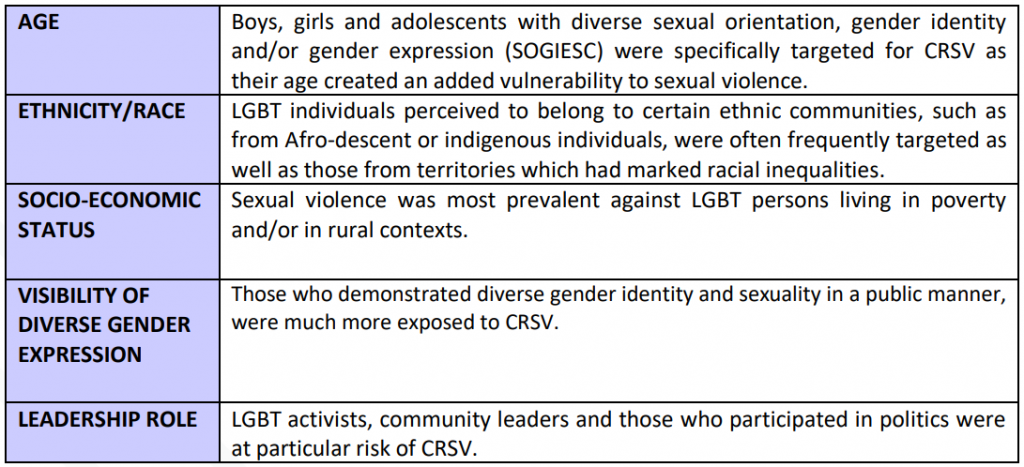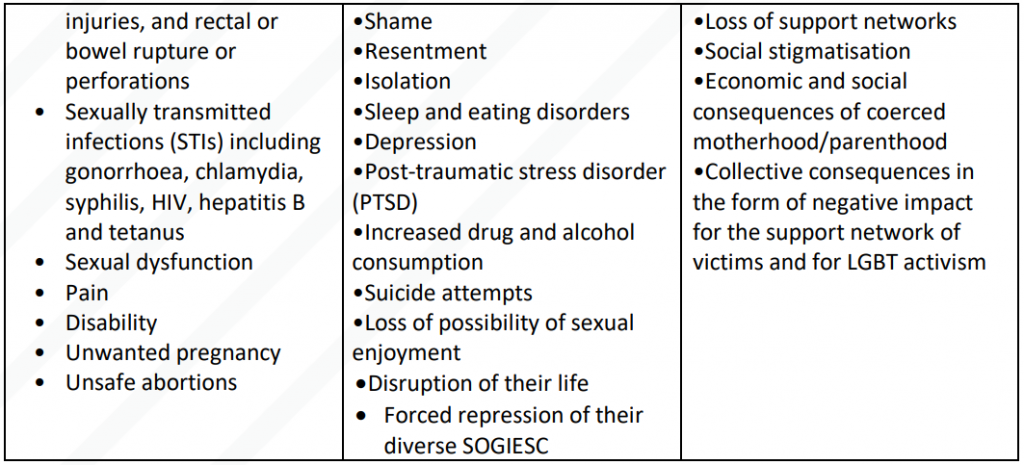It was a systematic form of violence based on prejudice
- During the armed conflict in Colombia, all parties to the conflict perpetrated sexual violence against LGBT people.
- Such violence was not committed randomly or by chance. On the contrary, it occurred during operations by paramilitaries, Revolutionary Armed Forces of Colombia – People’s Army (FARC-EP) and state security forces.
- This type of violence was used against individuals who crossed socio-cultural norms on sexuality, gender and desire, that is, people who did not fulfil social expectations of what it means to be man-masculine-heterosexual and woman-feminineheterosexual.
- During the many episodes of violence, perpetrators displayed their prejudice through degrading treatment of LGBT people.
- Against this background, this type of violence was used to “set an example” and as a “sobering” message to society in the context of so-called “social cleansing” operations. Therefore, it is important to understand this violence as a form of persecution against LGBT people used for strategic objectives which include:
- TO PUNISH mainly gay men and trans women for “renouncing” the privilege of masculinity and for trying to enter the world of femininity.
- TO CORRECT mainly lesbian women with male gender expression and trans men, justifying sexual violence as a “cure” for their sexual orientation.
- TO SUBORDINATE with the aim of reminding victims that their bodies were seen as the ‘property’ of armed actors. The bodies of the victims became spaces through which armed actors exhibited their capacity to exercise control in the territories.
- TO INSTRUMENTALISE their bodies to terrorise the community and thereby achieve advantages in terms of legitimacy in the communities and territorial control.
- Many forms of sexual violence were perpetrated by armed actors. The main types documented are:
- Rape
- Sexual slavery
- Forced witnessing or forced perpetration of sexual acts
- Forced nudity
- Sexual harassment
- Sexual violence could precede, accompany or follow other forms of violence such as insults, threats (often through pamphlets), cutting of nails and hair, beatings, homicide and forced displacement, which take place in the context of the continuum of violence that LGBT people faced in the context of the armed conflict.
- Many of these forms of sexual violence also constitute torture, both because of their collective and repetitive nature, because of their prejudicial motives and because of their purpose of inflicting punishment and humiliation.
- Despite the large under-reporting of cases, the following figures have been documented:
- As of March 2020, the Victim’s Registry (RUV) had identified 481 LGBT victims of sexual violence since 1985.
- In Colombia Diversa’s database on grave human rights violations committed against LGBT people in the armed conflict, out of 138 registered cases, 38 relate to sexual violence.
- Caribe Afirmativo has interviewed 46 victims, of whom 32 have suffered sexual violence; several on more than one occasion. Some victims also reported cases of sexual violence suffered by other LGBT victims, who have deceased or with whom there is no contact.
Armed actors took advantage of conditions of greater vulnerability to select their victims:
Certain LGBT people face increased risk of CRSV based on vulnerability factors such as:

This violence has multiple and differential impacts:
Sexual violence has serious consequences on the lives of victims which include:


In Colombia, violence due to prejudice was enabled by complicity from society but at the same time social prejudice also fed that violence. Complicity and silence by civil society contributed to violence in which LGBT people were victims. Thus,
Structural discrimination + social complicity + judicial impunity
have contributed to:
- The silencing of victims
- The lack of availability of quality medical, mental health and psychosocial care
- The destruction of ties of affection, friendship and family
- The fracture of collective organisation processes
- The lack of reparations
The State does not respond:
- Right to health: The majority of LGBT victims of CRSV have not received medical and psychosocial care from the State or have encountered barriers in exercising their right to health. Some of these have been:
- Lack of knowledge of the specific medical and mental health needs of LGBT victims.
- Lack of resources and capacity to deliver gender competent services and programming which responds to the needs of LGBT victims.
- Re-victimisation, lack of confidentiality and denial of services to LGBT victims.
- Barriers in the provision of comprehensive health responses such as timely offers of options for voluntary termination of pregnancies in cases of sexual violence or the unavailability of post-exposure prophylaxis (PPE) that must be administered within the first 72 hours.
- Right to justice:
Historically, LGBT victims have faced serious barriers in reporting acts of violence. This was known by armed actors, who often created and took advantage of this situation. Lack of effective access to justice is exacerbated in cases of violence by state security forces.
Victims have also experienced violence in accessing or demanding justice with documented cases of revictimisation. Loss of confidentiality has also caused victims to face reprisals from armed actors.
The victims demand access to justice, knowledge of the truth, reparations and guarantees that such violence never happens again:
For more than a decade LGBT victim of the armed conflict have demanded to be heard by the State and to participate in the transitional justice measures adopted over the past two decades:
- Participation in the process carried out by the Justice and Peace Chamber of Bogotá against the leaders of the ‘Autodefensas Campesinas de Puerto Boyacá’ (case of Arnubia Triana Mahecha, alias “Botalón”) in the framework of Justice and Peace in which the Chamber deemed former members of ‘Autodefensas Unidas de Colombia’ (AUC) responsible for perpetrating grave violations based on prejudice against three trans women.
- Participation in the implementation of Law 1448 of 2011 known as the ‘Victim’s Law’, both in administrative programs of reparation (individual and collective), as well as in the implementation of initiatives of memorialisation such as the creation of the National Centre for Historical Memory.
- Participation in the peace process between FARC-EP and the State of Colombia to defend the gender and differential approach.
- Submission of three reports to the Special Jurisdiction for Peace (JEP) in 2019 by Caribe Afirmativo and two more by Colombia Diversa on violence against LGBT people in the context of the armed conflict. On March 29, 2019, the first time such reports were submitted to a transitional justice tribunal in the world (one by Colombia Diversa on Tumaco and one by Caribe Afirmativo on Urabá). The reports included the following findings in five departments:
- Nariño (Tumaco) (Case 002 of the JEP) -> out of 8 cases, 6 included sexual violence and, in 5 of them, sexual violence resulted in forced displacement; these victims have been accredited by the ‘Recognition Room’ and their legal representatives are participating as special interveners in the voluntary appearances made by FARC-EP in this macro case;
- Antioquia (Case 004 of the JEP) -> Submitted by Caribe Afirmativo, in the first report, 20 LGBT victims were interviewed, 15 of whom suffered sexual violence. Of these 15 victims of sexual violence, 10 were accredited by the JEP in Case 004. Some of these victims suffered sexual violence on more than one occasion and recounted cases of sexual violence suffered by others who had deceased or whom with they had lost contact.
In the second report, an extension of the first, 6 LGBT victims from Urabá were interviewed. Four of them were victims of sexual violence and three of them were minors at the time of the crime.
- Montes de María -> Submitted by Caribe Afirmativo, this report interviewed 20 LGBT victims, 13 of whom suffered sexual violence. Some of these victims suffered sexual violence on more than one occasion and recounted cases of sexual violence suffered by others who had deceased or with whom they had lost contact.
- Tolima: Colombia Diversa submitted a report in September 2019 with 9 cases of armed violence based on prejudice against LGBT people. One of these cases included sexual violence against a trans woman.
- Creation of the gender group of Truth, Coexistence and Non-Recurrence Commission (CEV), which also includes work with LGBT people, and submission of one report by Caribe Afirmativo and one by Colombia Diversa to the CEV. Both organisations are part of the Technical Support Group of this gender group, set up with the aim of promoting technical and methodological discussions to support the clarification and non-repetition of this violence against LGBT people. The report submitted by Caribe Afirmativo is the first to be submitted by LGBT civil society to a truth commission.
–
Despite positive developments in law and jurisprudence that are advancing the recognition of the human rights of LGBT persons in Colombia, awareness of the sexual violence they suffer as a form of violence based on prejudice remains insufficient and responses continue to be inadequate and inefficient.
The transitional justice process presents a historic opportunity to recognise the causes of CRSV against LGBT persons, provide accountability and recommend the measures necessary to address and prevent sexual violence.

